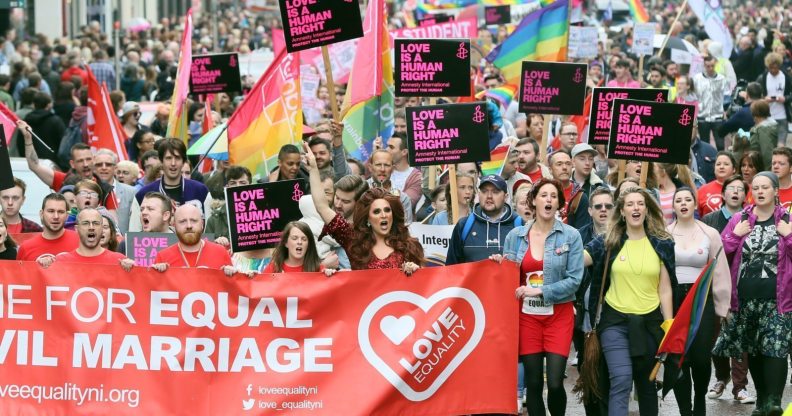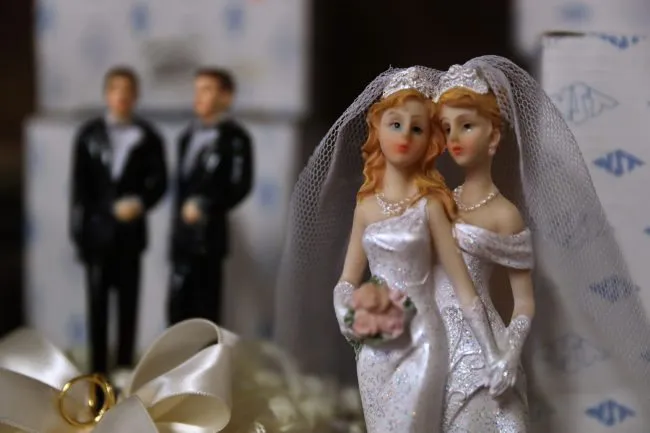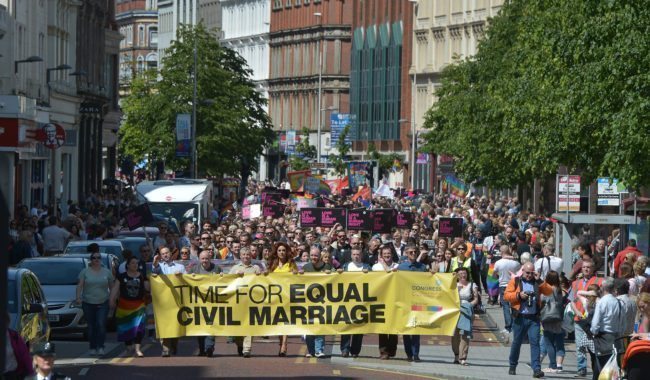Two-thirds of people in Northern Ireland want same-sex marriage, says new report

Gay rights campaigners take part in a march through Belfast on July 1, 2017 to protest against the ban on same-sex marriage.
A new report has revealed that nearly two-thirds of people in Northern Ireland are in favour of same-sex marriage being introduced.
The research, published by Queen’s University Belfast, involved interviewing 1,012 people from across Northern Ireland about their attitudes to various issues affecting the country, including gay marriage and the Brexit vote.
Some 63 percent of people surveyed supported same-sex marriage becoming enshrined in law in Northern Ireland.
Researchers also noted that half of Protestants interviewed supported gay marriage – compared to three quarters of Catholics.
The new data suggests that the clamour of support for gay marriage in Northern Ireland is growing, with comedian John Bishop voicing his support for the same-sex union this month.
Northern Ireland is the only part of the UK that continues to ban same-sex marriage, as the ultra-conservative Democratic Unionist Party has blocked progress on the issue despite public support for equality.

(Justin Sullivan/Getty)
Polling shows that an overwhelming majority of people in Northern Ireland support equal marriage, and campaigners fear that unless action is taken in Westminster it could be many years before the impasse is solved following the failure of power-sharing in the region.
In April, a poll by Sky Data found that fewer than one in five people in Northern Ireland are opposed to equal marriage.
But attempts to take action over the issue in Westminster have been so far been halted.
Earlier this month, a Conservative MP shot down a cross-party push to bring equal marriage to Northern Ireland.
Labour’s Conor McGinn had brought a bill to the UK Parliament seeking to extend same-sex marriage to Northern Ireland following the collapse of the devolved Northern Irish government.
However, despite support from MPs across the major parties, McGinn’s bill was denied a second reading in the House of Commons, following an objection from a backbench Conservative MP who moved to block the bill coming to the floor.

Thousands of people take part in a Belfast march and rally calling for legislation for same-sex marriage (Photo by Charles McQuillan/Getty)
Private members’ bills rarely become actual legislation, but the decision to prevent progress on the bill led to anger from LGBT rights campaigners.
The next opportunity to promote the bill in the Commons will be in October.
McGinn said: “Hundreds of thousands of people in Northern Ireland who support the right of same-sex couples to marry will be outraged that one English Tory MP has been able to prevent the progress of my Equal Marriage Bill in the House of Commons today.
“While it is welcome that the Government did not formally object to the 2nd Reading of the Bill, they need to clarify how they intend to ensure that the right to equal marriage in Northern Ireland – which has the support of the Assembly, Parliament and the public – becomes law.
“The Government can’t continue to talk out of both sides of its mouth on this issue. It can and should legislate to extend equal marriage to Northern Ireland.”

